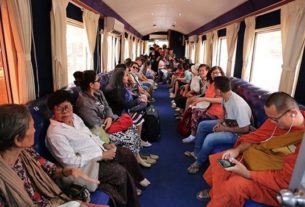The Kunming-Singapore High-Speed Railway began construction on April 25. The railway will shorten the travel time between Kunming and Singapore to only a little more than 10 hours in the future.
The Chinese government expects the railway to be put into operation by 2020. The line, starting from Kunming, capital of Yunnan Province; passes Mohan, a border town with Laos; and Wangrong, a popular Chinese tourist city; and ends in Vientiane, capital of Laos. Construction of the Mohan Railway Logistics Center has already started.
According to the Intergovernmental Agreement on the Trans-Asian Railway Network, the Kunming-Singapore High-Speed Railway, which is in fact the central line of the southeast part of the Trans-Asian Railway Network, will also pass Bangkok and Kuala Lumpur, and end in Singapore, with a total distance of 3,900 kilometers. Once completed, it will take passengers a little more than 10 hours to travel between Kunming and Singapore by train.
Chen Tiejun, a researcher at the Institute of Southeast Asian Studies under the Yunnan Academy of Social Sciences, said that the Trans-Asian Railway Network has a far-reaching impact on countries in the Greater Mekong Sub-region.
The Association of Southeast Asian Nations (ASEAN) occupies an increasingly important strategic position due to the acceleration of ASEAN integration. The ASEAN-China Free Trade Area has removed man-made trade barriers, but the removal of natural barriers will require the construction of the Trans-Asian Railway Network and other infrastructure.
After the Trans-Asian Railway Network is completed, Vietnam and Cambodia will be linked with Thailand and Myanmar by train, and China will have a closer political and economic relationship with countries in the Mekong River Basin where the total population has reached 300 million people.
Furthermore, energy and goods that Japan and South Korea need can also be transported to both countries through this railway network of global significance.
The railway network will facilitate the movement of goods and people, improve the efficiency of economic activities, and help create a more peaceful and stable geopolitical environment.
Source: http://english.peopledaily.com.cn/90001/90776/90882/7360790.html


